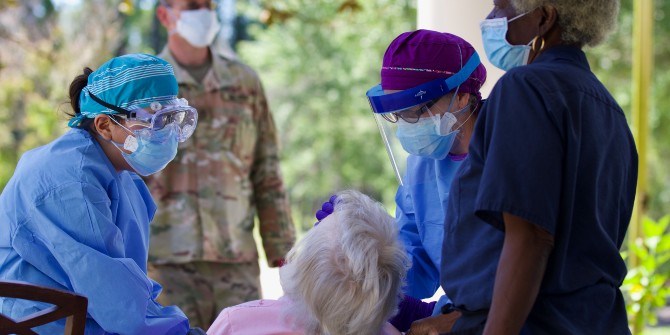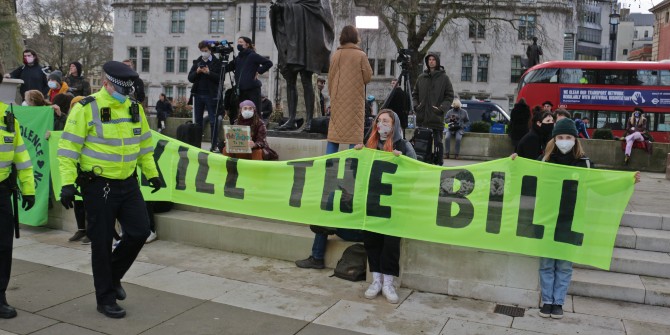Faced with an overwhelming crisis, governments across the world grappled with difficult policy choices in response to COVID. Resolving these challenges now—by adopting an active learning mindset, enabling greater collaboration, and setting up a robust data infrastructure—can prepare us to better mitigate the medium- and long-term impacts of COVID, as well as to effectively respond to future crises, write Jishnu Das (Georgetown), Adnan Q. Khan (LSE), Asim I. Khwaja (Harvard) and Anum Malkani (Centre for Economic Research in Pakistan).
Through lengthy and extensive engagement with governments in India and Pakistan during the COVID crisis, it became increasingly apparent to us that policymakers were hamstrung by their limited understanding of how to acquire the relevant knowledge and capacity. Learning to learn was something that COVID forced on many governments without the requisite training or tools.
Governments around the world were handicapped by the limitations of standard templates for policy problems. They have struggled with how to design, implement, and monitor policies in the context of a virus whose impact varies across space and time. The often contradictory messages from different experts and disciplines, the lack of effective coordination between different policy actors, and the limited efficacy of top-down policies that pay little attention to citizens’ agency have further contributed to the policy confusion. COVID forced governments to contend with how to act when there is an absence of evidence.
Diverse expertise could also have shed light on various aspects of the crisis. The role of epidemiologists and infectious disease specialists is obvious for a pandemic response, but we can also leverage the frameworks and toolkits of social scientists to better understand the impact of the crisis. Education specialists could help us understand the consequences of disruptions in schooling on child development and the future labour force. Behavioural experts and anthropologists can shed light on how best to design and enforce public health interventions.
While it may be the case in rich countries that the trade-off between lives and livelihoods is a false dichotomy, whether this is also the case for low-income countries is less clear. Indeed the literature suggests a potentially starker trade-off in low-income countries due to economic vulnerability, food insecurity, informality, and limited fiscal space. However, the absence of regular monitoring data hindered the ability of states and organisations to design lockdown and physical distancing strategies that could potentially mitigate the spread of COVID without incurring the loss of livelihoods and incomes.
Unhealthy competition and a desire to avoid blame has often been a priority for governments
Collaborating across tiers and agencies of government in a way that is centrally coordinated but still locally responsive has posed a substantial challenge. For example, the wave of migrant workers returning from urban areas to their rural homes following the initial lockdown in India sparked a rural COVID outbreak that could have been mitigated with better coordination of policy responses across the country (for example, putting in place quarantine centres and testing facilities before the lockdown was announced to prepare for the returning workers).
It has not been uncommon to see different agencies within the same government not cooperating and, in some cases, working at cross purposes. Unhealthy competition and a desire to avoid blame has often been a priority for governments throughout the pandemic. Such competition has been apparent in unitary states, where national and local governments conflict, but has been particularly evident in federalised countries, especially where the central and state governments hail from competing political parties, such as in Brazil, the United States, and Malaysia.

Also consistently lacking has been the right balance between politics and expertise. Many governments have failed to effectively rely upon expert authority, preferring political expediency over difficult decisions, while others have outsourced as much decision-making as possible to the experts, with a view of shielding themselves from responsibility for the impact of policy interventions.
A way forward
Adopting an active learning mindset
A crisis response that works must be not only clear and decisive, but also flexible and modular to incorporate rapid learning. In an uncertain world, policy responses must be based on data and evidence and they must be data responsive. For this to take place, we must recognise that we are in a learning environment marked by experimentation. Governments and policymakers should not only act based on existing knowledge, but also take steps to better understand the costs and benefits of each policy and to refine actions in accordance with new knowledge.
In situations with limited prior information, we should recognise that there is a well-developed and well-tested machinery for how to make decisions amid uncertainty. In other words, learn as you act and act to learn.
Some decisions will essentially remain the same regardless of what information becomes available. For instance, information is unlikely to change the need for testing and PPE, faster vaccination for health workers, or careful communication regarding Covid-19. In these cases, there is no point waiting for the information to become available. Governments should act immediately and communicate unequivocally.
Other decisions are best made after collecting some information—especially if that information is relatively costless to collect. These decisions are ones where more information may change the decision. Suppose you are driving a car and you cannot see beyond a point. You have been told that beyond that point, either there is both a cliff and you will die if you go over it, or there is a beautiful meadow where you can stop and have a picnic. The obvious decision is to stop the car before that point and check before driving on. For countries that imposed sudden lockdowns like India, even a rapid real-time survey could have helped the government realise that migrants would rapidly leave urban areas if a sudden lockdown was imposed, and this would have allowed multiple mitigation measures to have been put in place. Countries can be prompt in their response but without rushing blindly into decisions.
Learn as you act, and act to learn
In making decisions, all prior information should be used. Maps that allow us to better understand the underlying vulnerability of populations so that governments can undertake a spatially targeted strategy are one example. Understanding population density in areas using census data, as well as mobility patterns based on cell phone data, could help identify areas that are more susceptible to infection spread and therefore may be candidates for greater monitoring and containment policies.
For example, existing data could have been used for better stratification and targeting of responses. Consider governments deciding between a general lockdown and a ‘graded’ lockdown, whereby certain groups are allowed greater freedom of movement to keep our economic engines running and so offering a degree of economic sustainability, especially for the poor.
One way of doing so would have been through risk stratification: Hospitalisation risks for COVID increase with age and pre-existing chronic conditions. Therefore, allowing for potentially greater movement among the young and healthy while protecting our elders could have allowed for the resumption of economic activity and gradually built up immunity in our populations; even though the young will remain more likely to be infected.
Such risk stratification could also be spatially targeted by maintaining stricter restrictions in places with a larger agglomeration of older people and/or those with additional co-morbidities. For example, Italy introduced spatially targeted lockdowns based on risk stratification. It implemented a four-tier system, with areas with higher infection levels facing tighter restrictions. The government could have even more finely grained the stratification by taking into account morbidity profiles. We are not flying completely blind here. There is enormous prior information that can be brought to bear on this issue. It should.
Governments must recognise that every decision will have an impact on the outcomes of interest and will also provide further information. This new learning can critically inform the decision-making process tomorrow. For example, consider a policy of locking down part of a city. While the immediate purpose of doing so may be to prevent disease spread, understanding how people react to such policies—not just in terms of compliance but also whether this affects mobility patterns in other parts of the city—can help us understand how such partial lockdowns would affect longer term disease spread. Similarly, actions that generate critical information—even if they lead to limited immediate benefits—gain priority under such a perspective. As an example, sewage-based testing for disease prevalence, while less helpful in targeting treatment response, could help identify areas where disease may be spreading. This moves us away from passive to active learning and must be a key component of the strategies in both high- and low-income countries.
In adopting such approaches it is critical for governments to use a ‘big tent’ approach comprising economists, data scientists, infectious disease and public health specialists, technology sector leaders, as well as testing partners and government departments—and for governments to tailor this group to the specific crisis faced. Efforts to assemble broad coalitions and diverse expertise must be systematically done, because disciplines often do not naturally coordinate with each other.
Improving coordination and building state capacity for crisis response
While performance is correlated with existing state capacity, the heterogeneity in COVID policy responses demonstrates that governments with high state capacity can fall short while governments with more limited capacity can formulate timely and effective policy responses to the pandemic. The key test of a dynamically effective response lies in whether governments can leverage the current experience to build robust state capacity for responding to crises in the future. This depends to a great extent on politicians leveraging the experience of shared sacrifice into a sense of common purpose that justifies and underpins a shift in future policies.
Digitising census data is critical and can yield huge benefits
To create a learning state that can coordinate between the relevant actors, it is, first, important to prepare plans and templates and to introduce organisational structures based on current knowledge for managing potential crises. These plans must be flexible and capable of revision and refinement based on new knowledge. Governments need to create new structures in the face of crises. These structures do not have to exist in advance but can be introduced mid-stream, created on the basis of new knowledge, and they are also not solely the preserve of wealthy, highly resourced countries. For example, Liberia and Sierra Leone were able to create fast, flat, and flexible structures to successfully deal with the Ebola epidemic.
Second, it is critical to create central structures that can coordinate across agencies, empower distributed leadership and decentralised actors, enable local innovation, and disseminate active learning through experimentation. The central entity can also ensure sufficient focus on both the short-term, emergency response to the crisis as well as considering the medium- and long-term analytical work for augmenting preparedness by building more robust, capable, and self-correcting structures.
Third, to create a learning and cooperative culture, governments must devise ways to escape organisational turf wars and blame-games. This is best done through creating norms and procedures for sharing credit for policy innovations and successes, and similar processes for mitigating blame in case of failure.
Fourth, it is critical to build capacity in using and analysing data in relevant public agencies dealing with crises. Because generalised trainings are rarely effective, this capacity should be linked to providing concrete answers and supporting specific decisions and actions.
Preparing data infrastructure for crisis response
Crises require immediate action, and delays can be very costly. In the context of COVID and other health pandemics, policy paralysis could result in unmitigated spread of the disease. Building information/data systems to support effective and rapid decision-making is critical. But rather than building systems from scratch in the midst of a crisis, or acting blindly in the absence of such systems, governments need to plan strategies and to build data infrastructure before a crisis hits.
Digitising census data is critical and can yield huge benefits for service delivery. Governments should invest now in establishing pre-existing systems of digitised, geo-coded data infrastructure overlaid with useful data (demographic, public sector, and new, digital sources of data), along with protocols to activate, access, and build upon these in real time to support coordination during emergencies by both public, private, and non-profit actors. Second, governments can undertake a number of measures to build a data infrastructure that leverages existing data sources, especially administrative data, and which standardises and links different data sets. In doing so, it is important to work with the private sector to securely harness ‘big data’ through mobile records, electricity consumption, and other sources, and to design voluntary mechanisms for citizens to share relevant data, while ensuring they are done in line with data sharing and anonymity protocols.
Finally, while it is important to be creative in how we think of data, data and technology needs should be directly tied to policy needs. Existing large-scale household surveys can be replaced or augmented with new technology-based data sources, such as call detail records (CDR), satellite data, and electricity consumption. However, before doing so, one needs to clearly define what types of data are useful to researchers and policymakers, establish how these data can contribute to development programs and humanitarian efforts, and build robust frameworks around data privacy and security.
This post represents the views of the authors and not those of the COVID-19 blog, nor LSE. It is based on Das J, et al. Preparing for Crises: Lessons from Covid-19. LSE Public Policy Review. 2021; 1(4): 8, pp. 1–10.





